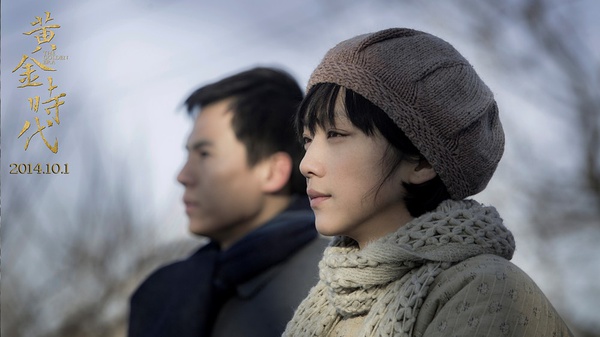
【電影簡介】
上世紀二十至四十年代的中國,那是一個民氣十足、海闊天空的時代,一群年輕人經歷了一段放任自流的時光,自由地追求夢想與愛情,有人在流離中刻骨求愛,有人在抗爭中企盼家國未來。蕭紅,一個特立獨行的女子,一路流亡,從北方到南方,從哈爾濱到香港,一邊躲避戰亂,一邊經歷著令人唏噓又痛徹心扉的愛情與人生。對生的堅強對死的掙扎在她筆下穿透紙背,她的人生亦是如此。
【音頻文本】
Before seeing Chinese director Ann Hui's latest offering "The Golden Era", I was compelled to do a bit of homework, because this biopic of Chinese writer Xiao Hong seemed pretty daunting to anyone who is not familiar with Chinese literary circles in the early 20th century. However, after a grueling three-hour-long screening, I found these efforts totally unnecessary.
"The Golden Era" is along the same line of the director's usual creative impulse of telling stories from afeminine perspective. Her version of Xiao Hong is a girl who spent her entire life running away from patriarchal control, yet had to rely on men at each step she took. It was an era when traditional values began to dissolve along with the collapse of China's last imperial dynasty, but it was not at all a golden era for women.
At about the age of 20, Xiao Hong eloped with a young man to escape her abusive father and an arranged marriage. Her conspirator of a boyfriend abandoned her when hotel bills swelled beyond their means. Confined by the hotel owner who threatened to sell her to a brothel, a pregnant Xiao Hong wrote to a local newspaper asking for help. That was how she met Xiao Jun, a married man and the editor of the newspaper who later became her partner both in life and in her literary career. With the encouragement of Xiao Jun, Xiao Hong began the life of a writer and gradually established her name among the literary circles. But eventually the couple split up due to different life choices and Xiao Hong married another man, a couple of years before she died of tuberculosis.
The film was expected to include a panorama of Chinese literary figures of Xiao Hong's time and to offer an insight into that part of Chinese history. It was a reasonable expectation because the director had three hours to fill, with nothing but the 31-year of Xiao's tragically short life. However Ann Hui hardly paidany heed to characters other than the most important men in Xiao's life. As for the turbulent and eventfulhistory, that was scarcely the concern for Xiao Hong the writer, and was therefore given minimum attention.The focus of the film remains on the fate of the female writer in relation to the men in her life.
Some critics also lashed out at the director's experiment with the narrative format. Much of Xiao Hong's life remains a myth due to contradicting accounts offered by her contemporaries. These accounts are frequently brought up as interludes in the film, where the speakers often address the audience directly. Such arrangement may seem a bit strange and could create a false sense of authenticity. But "The Golden Era" is not to be mistaken for a documentary; it is merely a conduit for the expression of feminine ideas.
Lead actress Tang Wei is not to blame for a character that's constantly in sight but never in focus; she'sdone her best to portray a mystical woman within the constrains of the script. Feng Shaofeng, Wang Zhiwen and Zhu Yawen also present as much skill as is needed in the plot.
"The Golden Era" is a film for a niche audience; it is not likely to make much of a dent at the box office.But I'm sure it'll resonate among the most understanding critics and viewers.
輕松調頻EZFM 微信mrweekly











